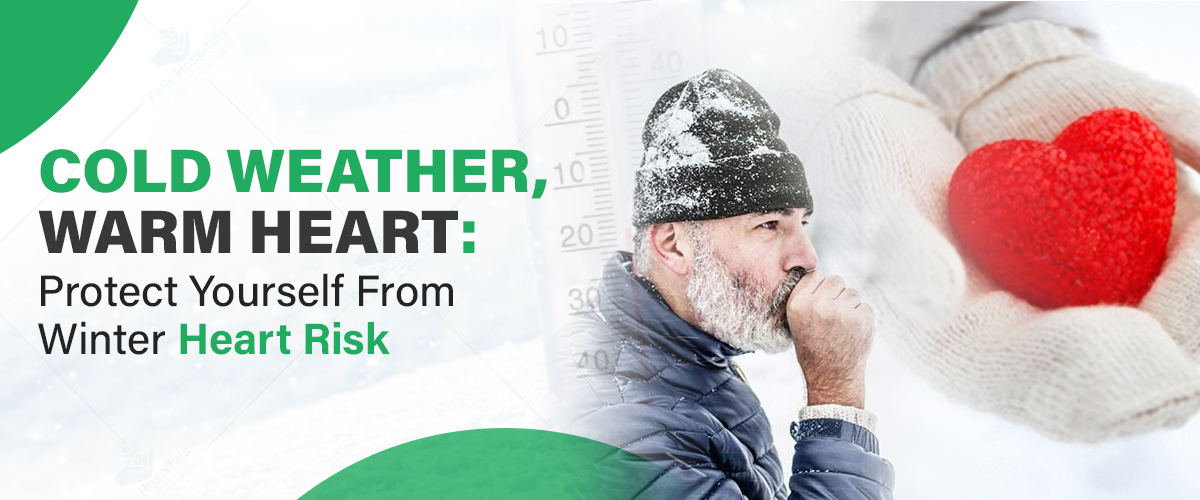
Subscribe to our

As the winter months approach, we often look forward to cozy moments by the fireplace and winter festivities. However, cold weather can have a significant impact on heart health, increasing the risk of heart-related issues. Research indicates that the risk of heart attacks and strokes rises substantially during the colder months. Cold weather can contribute to a 40% increase in heart attack cases. It is crucial to take proactive measures to protect your heart during these months. This blog will explore the connection between cold weather and heart risks, precautionary steps to take, and how to recognize winter heart attack symptoms.
If you're experiencing any winter heart attack symptoms, don't wait. Contact Felix Hospital today by Calling +91 9667064100.
Cold weather can stress the cardiovascular system in multiple ways. When temperatures drop, the blood vessels constrict, which can raise blood pressure and reduce blood flow to vital organs, including the heart. This physiological response places additional strain on the heart, increasing the likelihood of heart attacks, strokes, and arrhythmias. Furthermore, the body works harder to maintain its core temperature, resulting in an increase in heart rate and blood pressure. This combination of factors is a major contributor to the higher incidence of heart attacks in the winter months.
Maintaining heart health year-round is crucial for longevity and overall well-being. In winter, consider eating heart-healthy foods like omega-3-rich fish, vegetables, fruits, and nuts to support cardiovascular function. Additionally, maintaining a consistent sleep schedule, avoiding smoking, and limiting alcohol consumption can help reduce the strain on your heart. It’s important to be mindful of how cold weather can impact your heart, so seeking care at the best hospital for a heart attack in winter can make a significant difference in managing heart-related risks. Remember to take steps to protect your heart and seek medical guidance whenever necessary to ensure your cardiovascular health remains strong throughout the year.
At Felix Hospital, you’ll find the best cardiologists in Noida, dedicated to providing exceptional care for patients with congenital heart conditions and heart-related concerns during the winter months.
Choose Felix Hospital for trusted expertise in treating heart defects and maintaining heart health during the colder months.
If you’re concerned about your heart health during the colder months, schedule an appointment with one of the best cardiologists at Felix Hospital.
As winter approaches, it is crucial to be aware of the risks posed to heart health, including winter heart attack symptoms. By dressing appropriately, exercising safely, and taking steps to manage stress and health conditions, you can protect your heart this season. If you experience any signs of a heart attack or stroke, seek immediate medical help. The Heart Attack treatment cost in winter may vary, but timely intervention can significantly reduce the risk of complications. Stay proactive, and consult a healthcare professional if necessary to ensure your heart remains healthy throughout the winter months.
Q- Why does cold weather increase the risk of heart attacks?
Ans- Cold weather causes blood vessels to constrict, raising blood pressure and heart rate. When combined with physical exertion, such as shoveling snow, this increases the workload on your heart, leading to a higher risk of heart attack.
Q- What are the key symptoms of a winter heart attack?
Ans- Symptoms of a winter heart attack include chest pain, shortness of breath, dizziness, fatigue, and nausea. If you experience any of these symptoms during cold weather, seek medical help immediately.
Q- Can cold temperatures cause arrhythmias?
Ans- Yes, cold temperatures can disrupt the heart’s electrical activity, leading to irregular heartbeats (arrhythmias), especially for individuals with existing heart conditions. It is crucial to monitor heart health during winter.
Q- How can I safely exercise in winter without risking my heart?
Ans- To exercise safely, opt for indoor activities or ensure a proper warm-up before going outside. Avoid sudden exertion in the cold, and consider wearing layers to stay warm while exercising outdoors.
Q- What lifestyle changes can I make to support heart health during winter?
Ans- Maintain a heart-healthy diet rich in omega-3 foods, fruits, vegetables, and nuts. Monitor blood pressure, manage stress levels, stay hydrated, and ensure adequate sleep to support your heart health during winter.
Q- Is it important to dress warmly to protect my heart?
Ans- Yes, dressing warmly is essential to prevent stress on your heart. Layering your clothing and wearing hats, gloves, and scarves helps retain body heat, allowing proper blood circulation to your vital organs.
Q- What are some warning signs of a stroke during cold weather?
Ans- Stroke symptoms include sudden numbness or weakness, especially on one side of the body, confusion, trouble speaking, or difficulty walking. If you notice any of these symptoms, seek emergency medical help immediately.
Q- What is the heart attack treatment cost in winter?
Ans- The cost of heart attack treatment during winter can vary depending on the severity and type of treatment required. However, timely intervention is essential for reducing complications, and seeking immediate medical care can save lives.